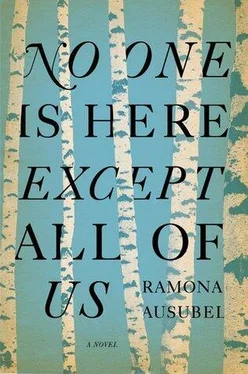For what would seem like a very brief moment, he was still my baby. I looked down at Solomon, his eyes open to whatever we passed. “These are the fields where we grow our food. This is wheat for bread.” Explaining the world to my son, I noticed things I had not before. Our houses were creeping with moss, greening from the ground up. The window trim was no longer the brown of wood but bright emerald. The houses appeared to be sinking slowly into the soft earth. Birds bathed in the mud puddles, which were everywhere. “These are the paths between the stalks we walk to get to the river. This is the river. I’m going to put you in it, let the water wash you clean. Are you ready?” I said, unwrapping him. “I’m coming in with you.” And I unwrapped myself too, my coat and dress and shoes, and we waded in together, Solomon pressed to me, until I dipped us down so that his tiny, complete body was as wet as mine and our skin was pushed by the rushing current and the reeds scraping on the shore cried out to us and the moon was white in the gray sky, and the river was a different gray, and I watched it slide off around the curve where it hugged the village and disappeared into another place and time.
Solomon did not cry. The river made all the sound we needed.
THE BOOK OF LOVE AND SECRETS
Three years passed under us. Three sweet, regular years. The tiled stars had spread out over the walls of the barn, white constellations against blue and black sky; they made us feel at home and safe. These days, we had many things to celebrate. My once-brother had fallen in love with the tailor’s delicate daughter, and they were to be married, Solomon would celebrate his fourth birthday soon, and I was due to give birth to my second baby. The heavens joined in the festivities by offering the best weather we could ever remember. It was a moment of mercy, of joy. It was also a farewell party, though we did not know it at the time.
This sun was full, complete, not just the clouded-over orb we had grown used to. We emerged with trepidation, carrying our umbrellas out of habit. We shed coats. We closed our eyes. We were made warm. I took Solomon to the greengrocer, where I picked carrots, a beet, a handful of pearl onions. The greengrocer put my basket down by the wooden cash drawer, where a slim stack of greasy bills looked deceased, coffined. Wordlessly, he reached out and patted my huge belly, then he placed his hand on my heart and closed his eyes. I started to step back, but he hushed and pressed. “I’m counting,” he said, his eyes unopened. “We haven’t measured you in a long time.”
“Sixty-five beats per minute,” the greengrocer finally said. “Very nice, excellent. You are just as you should be.” His statement surprised me by being true. Out of the muck, something green had sprouted. I paid quickly, the bell clinked, the door closed and I went around to the back of the shop, where I leaned against the mud wall and cried.
“What’s wrong?” Solomon asked.
“That’s the thing — nothing is wrong.” I was fine, I was big. I was just as I should be. If only it could have lasted longer.
On an evening full of the last gray light of a halfhearted sun, the stranger found herself alone in the barn with no prayers to record. She decided to sweep the floors and wash the windows with vinegar. She did not reach out the back window and prune the apple tree, because she liked the sound the leaves made when the wind pulled them across the pane. Where the wall and floor met, she found a dried-up lily of the valley. The stranger put it behind her ear. She admired the stars our village had made so far. She felt a kind of lightness — almost faith — when she looked at them. A universe was being constructed, even though there had been too many losses to write them out of the story. It was not the purity of this world that the stranger loved — it was how hard everyone had worked to believe in it.
In the corner still reserved for animals, the stranger swept under the sheep, who bleated and mewled. She put the scuffled-out hay back in the chickens’ nests. The chickens pecked at it. The stranger picked up a bowlful of feed and swept where it had been. The floorboard moved under her broom. She pressed it back into place but the other end came up. She pulled at that other end, and it opened like the top of a box. Underneath there was a dark hole and the scent of cold earth. She kneeled, pressed her hand to the dirt. She lowered her arm in, deeper and deeper until she touched a square object. The stranger pulled her empty hand back out quickly and looked at it, questioning, as if it might be able to tell her what it had found. The hand was mute.
The stranger closed her eyes and lowered her arm in again, this time waiting for the shape she knew she would find. She wrapped her fingers around it and pulled it slowly out. In the light, it became a radio. Speakers, dials and an antenna. It was not dirty, as it should have been if it were buried long ago. Her fingers grazed the dials, but did not turn them. “Do I?” she asked herself. The loss of her old, real life began to thrum in her temples, in her chest. She remembered the letter she had read, and how meager it had seemed. The old world’s failed attempt to matter. Here it was again, ready to make another plea.
Never forgotten, but never remembered completely either, the truth of what once was began to bubble up. The stranger remembered the smell of her husband’s neck after he had worked all day. She remembered the shoes by the door, and the heat of her daughter’s forehead when she had been sick in bed. She remembered the day everything exploded in flames. Belief, the way the villagers worked to hold up the misty walls of the reborn world, was what made the stranger love them. Still, she wondered what would happen if she put her arm through one of those walls; if she opened her hand to another world, what might she find? Quickly, she put the radio in the hole and laid the board back down. She waited for someone to bring her a prayer. The forbidden world stirred.
All of us migrated to the square, where we sat or stood, faces up, adoring the warmth. We could not believe how wonderful it felt or how big the world seemed — our entire village was flooded with light. We had had moments of sun over the years, glimpses, sometimes even whole afternoons, but this was something different. We were utterly saturated.
Solomon was pale from sitting in the dark all day. His skin looked so thin it might tear. With his face to the sky, he began to thank God for the sun, but I stopped him. “God hears you in your own head. He knows you’re thinking of him.”
“I have to thank him for each thing,” Solomon said.
Igor and Solomon had been spending whole afternoons in the temple, making little groups of blue progress. After a new space of sky had been made, Igor would let the sound of the prayers and the color of the artificial night lay him down and rest him. Solomon would keep working and kept listening, memorizing the incantations. There were prayers by now that we always sang the same way. Blessed are you who made us, blessed are we who praise you . Solomon had made a list of the blessings he could give and the blessings he could receive. When he and his father came home in the evening, he had prayed over everything he could: the bread, the water, the soup, the chairs, the table, the beds, the windows, the lights outside and the lights inside. Igor would fall right to sleep, but I would stay awake listening to my son chant to himself for a long time, the room breathing with his prayer. I bless this moment and this moment and this moment.
We sat quietly while Solomon said words in his head and I tried to let the warmth soak through to my second baby, who should have come days before. I watched a group of boys playing at the other end of the square. I knew Solomon did not play like that, did not tumble and build the way the others did. Had I made my little four-year-old into an adult before his time, even though all I wanted was for him to be exactly his own age, every day of his life? Had I kept him to myself, and now he only knew how to be like me?
Читать дальше












